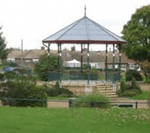Horden is a village in County Durham, England. It is situated on the North Sea coast, to the east of Peterlee, approximately 12 miles south of Sunderland. Horden was a mining village hosting one of the biggest mines in the country until the closure of the Horden Colliery in 1987.
In recent years Horden has benefited from the removal of mining spoil heaps and the redevelopment of its Welfare Park (which houses Horden’s rugby, cricket and football teams and the recently installed sculpture by Ray Lonsdale of a minor named ‘Marra’). In addition the Durham Heritage Coast Partnership (previously the lottery funded Turning the Tide programme) is committed to the conservation, protection and enhancement of the coastline, which is home to a rich variety of flora and fauna.
Horden’s population is around 8,500. It is connected to the villages of Blackhall Colliery and Blackhall Rocks to its south by a spectacular rail viaduct which spans Castle Eden Dene near Denemouth. Horden Dene provides Horden’s northern boundary with Easington Colliery. The A1086 road is the main road through the village linking with Easington and the A19 to Sunderland in the north and Blackhall and the A179 to Hartlepool in the south, the B1320 links the village to Peterlee and Shotton in the West.












